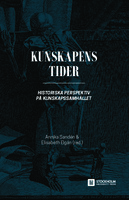Kunskapens tider: Historiska perspektiv på kunskapssamhället
| dc.contributor.editor | Elgán, Elisabeth | |
| dc.contributor.editor | Sandén, Annika | |
| dc.date.accessioned | 2016-12-21 00:00:00 | |
| dc.date.accessioned | 2020-04-01T13:53:46Z | |
| dc.date.available | 2020-04-01T13:53:46Z | |
| dc.date.issued | 2016 | |
| dc.identifier | 621502 | |
| dc.identifier | OCN: 1147301963 | en_US |
| dc.identifier.uri | http://library.oapen.org/handle/20.500.12657/31942 | |
| dc.description.abstract | Today's society is often characterized as a knowledge society, in contrast to the earlier industrial society. Historians however know that all societies are and have been knowledge societies. Without the ability to create, transfer, and use knowledge, between individuals and groups, power areas would neither have been built nor maintained. This edited volume reflects how historical actors, both those in power as well as laymen and officials, have produced and utilised information and knowledge from the Middle Ages until today. It acommodates research into census, urbanisation, history of kings and queens, exercise of public authority, social and political movements, disciplining and formation of opinion. In Kunskapens tider. Historiska perspektiv på kunskapssamhället (”The knowledge society. A historical perspective”) nine researchers from the Department of History at Stockholm University contribute with examples of the need for and use of knowledge, in different historical situations and periods. | |
| dc.language | Swedish | |
| dc.subject.classification | thema EDItEUR::N History and Archaeology::NH History | en_US |
| dc.subject.classification | thema EDItEUR::N History and Archaeology::NH History::NHD European history | en_US |
| dc.subject.classification | thema EDItEUR::N History and Archaeology::NH History::NHF Asian history | en_US |
| dc.subject.classification | thema EDItEUR::N History and Archaeology::NH History::NHB General and world history | en_US |
| dc.subject.classification | thema EDItEUR::N History and Archaeology::NH History::NHT History: specific events and topics::NHTB Social and cultural history | en_US |
| dc.subject.other | knowledge enforcement | |
| dc.subject.other | power | |
| dc.subject.other | history of information | |
| dc.subject.other | organisation | |
| dc.subject.other | knowledge history | |
| dc.subject.other | resistance | |
| dc.title | Kunskapens tider: Historiska perspektiv på kunskapssamhället | |
| dc.type | book | |
| oapen.abstract.otherlanguage | Dagens samhälle karaktäriseras ofta som kunskapssamhället, till skillnad från det tidigare industrisamhället. Historiker vet dock att alla samhällen är och har varit kunskapssamhällen: Utan möjligheter att skapa, överföra och använda kunskap, såväl individer som grupper emellan, hade maktområden varken kunnat byggas eller vidmakthållas. Antologin speglar hur historiska aktörer, såväl makthavare som lekmän och tjänstemän, har producerat och utnyttjat information och kunskap från medeltiden till idag. Här ryms forskning om folkräkning, urbanisering, kungars historieskrivning, myndighetsutövning, sociala och politiska rörelser, disciplinering och opinionsbildning. I Kunskapens tider bidrar nio medarbetare från Historiska institutionen vid Stockholms universitet med exempel på hur behovet och användandet av kunskap sett ut i olika historiska situationer och tidsperioder. | |
| oapen.identifier.doi | 10.16993/bai | |
| oapen.relation.isPublishedBy | 8137467e-e537-45b2-b1c8-94fc2574b729 | |
| oapen.relation.isbn | 9789176350324;9789176350331;9789176350348 | |
| oapen.pages | 208 | |
| oapen.place.publication | Stockholm, Sweden | |
| oapen.identifier.ocn | 1147301963 |

